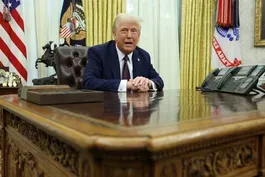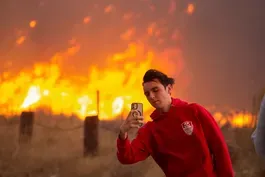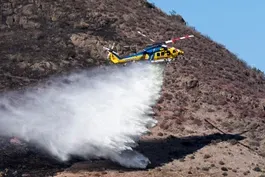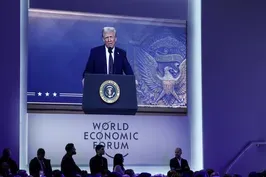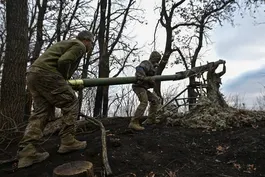
Judges who oversaw cases frustrated by Jan. 6 pardons
Clip: 1/23/2025 | 6m 52sVideo has Closed Captions
After Jan. 6 pardons, judges who oversaw cases express frustrations
In the days since President Trump’s sweeping clemency of Jan. 6 rioters, the federal courts have been busy processing the dismissals. But the judges who've spent years overseeing the hundreds of trials are not hiding their frustration. Geoff Bennett discussed more with John Jones, a retired federal judge who now serves as the president of Dickinson College.
Major corporate funding for the PBS News Hour is provided by BDO, BNSF, Consumer Cellular, American Cruise Lines, and Raymond James. Funding for the PBS NewsHour Weekend is provided by...

Judges who oversaw cases frustrated by Jan. 6 pardons
Clip: 1/23/2025 | 6m 52sVideo has Closed Captions
In the days since President Trump’s sweeping clemency of Jan. 6 rioters, the federal courts have been busy processing the dismissals. But the judges who've spent years overseeing the hundreds of trials are not hiding their frustration. Geoff Bennett discussed more with John Jones, a retired federal judge who now serves as the president of Dickinson College.
How to Watch PBS News Hour
PBS News Hour is available to stream on pbs.org and the free PBS App, available on iPhone, Apple TV, Android TV, Android smartphones, Amazon Fire TV, Amazon Fire Tablet, Roku, Samsung Smart TV, and Vizio.
Providing Support for PBS.org
Learn Moreabout PBS online sponsorshipGEOFF BENNETT: In the days since President Trump's sweeping clemency of January 6 rioters, the federal courts have been busy processing the dismissals.
But the judges who've spent years overseeing the hundreds of trials are not hiding their frustration.
U.S. District Judge Tanya Chutkan, who sentenced dozens of defendants and also oversaw President Trump's election interference case, criticized the decision in an order, saying -- quote -- "No pardon can change the tragic truth of what happened on January 6, 2021.
It cannot whitewash the blood, feces, and terror that the mob left in its wake."
While fellow U.S. District Judge Beryl Howell wrote -- quote -- "No national injustice occurred here.
Charges were fully supported by evidence.
This court cannot let stand the revisionist myth relayed in this presidential pronouncement."
The comments are some of the first made by judges following the president's decision to grant clemency to more than 1,500 people who were charged for the January 6 attack.
For perspective now, we turn to John Jones.
He's a retired federal judge who was appointed by President George W. Bush and now serves as the president of Dickinson College.
Thanks for being with us.
JOHN E. JONES III, Former Federal Judge: Geoff, good to be with you.
GEOFF BENNETT: You spent nearly two decades on the federal bench.
How do you perceive the impact of these pardons on the judiciary's role in upholding the rule of law and ensuring accountability for actions that undermine democratic institutions?
JOHN E. JONES III: Well, bravo, Geoff, to my former colleagues on the D.C. bench, because judges are not allowed under the code of conduct to make what are called extrajudicial statements about cases.
In other words, Judge Chutkan and Judge Howell can't call a press conference.
They shouldn't, and make statements, but they let their orders do the talking for them.
And you can read directly from their orders and tell that they're pretty anguished about the fact that these folks were pardoned.
They know these cases.
They understand what happened in these cases.
In many cases, they sentenced these people, and they're intimately familiar with the facts.
And they're simply, by their words, not accepting a false narrative that these were -- and I'm quoting the president -- that these were hostages.
GEOFF BENNETT: To your point about the false narrative, Donald Trump has for years now sought to reframe the public's understanding of what transpired on January 6.
He often refers to it as a beautiful day.
Another of the federal judges involved in the convictions said that the real history of that day is captured in the evidence.
Here's what District Court Judge Colleen Kollar-Kotelly said.
She says: "Those records are immutable and represent the truth, no matter how the events of January 6 are described by those charged or their allies."
How does that strike you?
Because we have seen, in this current moment, how the truth can so often bend to the power of perception.
JOHN E. JONES III: Well, that's exactly right.
And it's the old adage, if you say something enough times, people start to believe it.
But let's take the example, Geoff, of these judges.
In the case of a trial -- and many of them went to trial -- that judge sat through the trial and heard all of the evidence in the case, unbiased, impartial, without fear or favor.
The jury made the determination and the judge's job was to make sure the defendant had a fair trial.
Many of them pled guilty, however.
And when a defendant pleads guilty in federal court, there's a presentence report that is very thick and chock full of facts, and the defendant has the right to object to those facts and have a hearing if he or she believes the facts aren't correct.
So, again, these judges are intimately familiar with every shred of evidence in these cases.
And they're simply not buying the fact that these are victims or hostages.
And, in many cases, they know -- and I'm quite sure they know that there is a danger of recidivism, that is, that these defendants may get out and commit crimes.
And we can already see by the defendants' pronouncements, the pardoned individuals, they're far from full of remorse.
And, in fact, some have indicated that they're not going to play by the rules and that there will be retribution for what happened to them.
This all goes into the judges' calculus when they write the orders and make the comments that you very cogently presented.
GEOFF BENNETT: In some instances, the judges have opted to dismiss these cases without prejudice, meaning that they could be refiled hypothetically at some point.
Do you see a universe in which that could happen post-Trump?
JOHN E. JONES III: No, they're not going to be prosecuted again.
Geoff, that's just a statement by the judges, a little bit of a finger in the eye, I guess, maybe for a little psychic enjoyment, darkly enjoying it.
But they're not going to get refiled.
And I suspect that all the judges who would not dismiss with prejudice understood that.
GEOFF BENNETT: Big picture question, how should the judiciary maintain its independence in this moment, where so many Americans view the judicial branch as just another political branch?
JOHN E. JONES III: You know, I have been there and done that.
And I used to joke that, when I was on the bench, I thought my name was changed from Judge John -- from Judge John Jones to Bush-appointed Judge John Jones.
And I surprised some people by actually ruling in cases in a way that was against what folks thought I would do, given who appointed me.
I think that happens every day in the judiciary because judges take an oath.
I think the judiciary, properly operating, has to be a bulwark against the tyranny of the majority, and in this case against -- and it's not adversarial, per se, but if you have a president who doesn't respect the judiciary and who believes that they should bend to his will, the judiciary is going to have to stand up as a co-equal branch of government and call them as according to the facts and the law and the Constitution Without digressing into another topic, you're seeing that today with the birthright citizenship question.
And that's starting to appear on dockets across the country.
It will be very interesting to see how that plays out.
GEOFF BENNETT: Retired federal Judge John Jones, now president of Dickinson College, thanks so much for this enlightening conversation.
We appreciate it.
JOHN E. JONES III: Great to be here, Geoff.
Thank you.
How global business leaders are responding to tariff threats
Video has Closed Captions
How global business leaders are responding to Trump's tariff threats (3m 16s)
Judge blocks Trump's order ending birthright citizenship
Video has Closed Captions
Federal judge puts blocks on Trump's order to end birthright citizenship (6m 30s)
A look at destruction in Lebanon from Israeli airstrikes
Video has Closed Captions
A look at destruction in Lebanon from Israeli airstrikes and occupation of border region (6m 42s)
Meet the team behind Watch Duty app giving wildfire updates
Video has Closed Captions
Meet the small team behind the Watch Duty app giving life-saving wildfire updates (5m 35s)
News Wrap: California crews battling new fires in LA area
Video has Closed Captions
News Wrap: California crews battling new fires in Los Angeles area (5m 26s)
The steps an Ohio county took to reduce infant mortality
Video has Closed Captions
The steps an Ohio county took to reduce infant mortality rates (8m 17s)
Trump lays out demands in reintroduction to world stage
Video has Closed Captions
Trump lays out demands in virtual reintroduction to world stage (4m 50s)
Trump willing to use economic pressure on Russia to end war
Video has Closed Captions
Trump says he's willing to use economic pressure on Russia to end Ukraine war (4m 3s)
Providing Support for PBS.org
Learn Moreabout PBS online sponsorshipMajor corporate funding for the PBS News Hour is provided by BDO, BNSF, Consumer Cellular, American Cruise Lines, and Raymond James. Funding for the PBS NewsHour Weekend is provided by...


